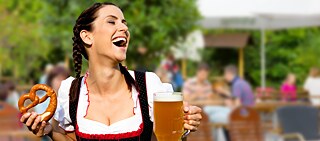So Germans are punctual, humourless, drink beer and are world champion travellers? We’ve subjected seven stereotypes about Germany to close scrutiny, and made some surprising discoveries.
Germany, a Nation of Cars
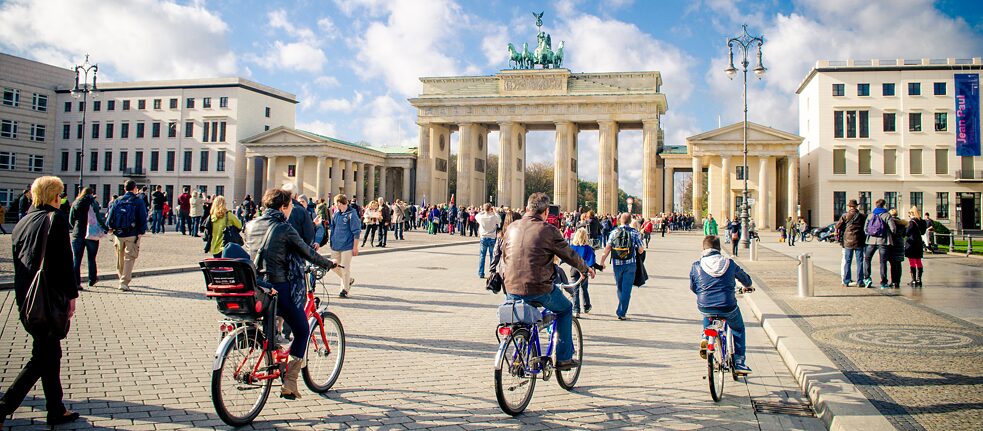 A nation of cars? Maybe so. But statistics tell us that bikes far outnumber cars, almost every German has one.
| Photo (detail): © Adobe
What’s the first word that comes to mind when you think of Germany? It’s fairly certain: motorway. BMW, Mercedes, Porsche! Germany is considered the land of the car cult and the automotive industry, and it’s the most important manufacturing sector in Germany for good reason. Germany is also the country that has Europe’s highest number of cars registered. Who isn’t familiar with the stereotypical image of the family father who spends Saturdays on the driveway of his detached home, devotedly scrubbing his car.
A nation of cars? Maybe so. But statistics tell us that bikes far outnumber cars, almost every German has one.
| Photo (detail): © Adobe
What’s the first word that comes to mind when you think of Germany? It’s fairly certain: motorway. BMW, Mercedes, Porsche! Germany is considered the land of the car cult and the automotive industry, and it’s the most important manufacturing sector in Germany for good reason. Germany is also the country that has Europe’s highest number of cars registered. Who isn’t familiar with the stereotypical image of the family father who spends Saturdays on the driveway of his detached home, devotedly scrubbing his car.
But appearances can be deceptive: compared with the rest of Europe, Germany’s only in eighth place for car density. Seven countries have more cars per person – in first place comes Luxemburg, followed by Italy and Poland – and by global standards Germany’s actually quite a lot further behind. Things are different with regard to cycling: Germany ranks third in the world for countries with the most bicycles per person, a figure exceeded only by the Netherlands and Denmark. Around 90 per cent of all Germans have a bicycle – but only a little over half own a car.
Bottoms Up!
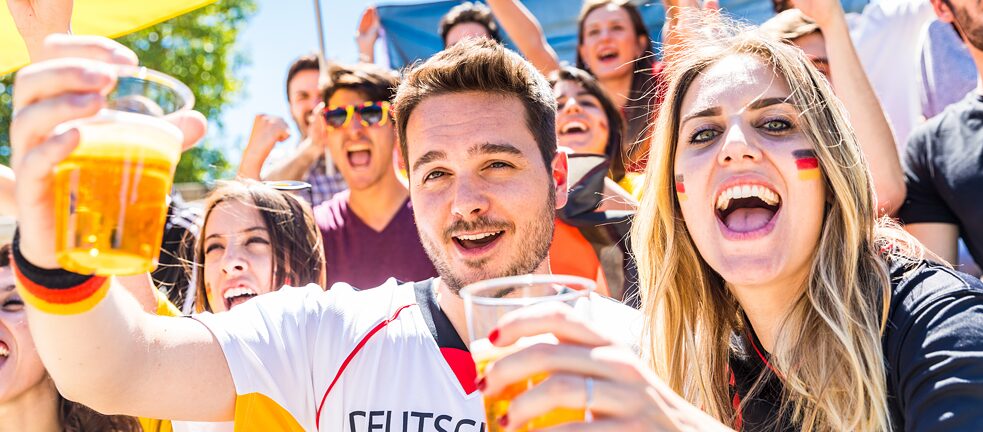 Beer is as much a part of Germany as a love of football. However, the Czechs are way ahead in terms of beer consumption per person, while the Germans are only in seventh place internationally.
| Photo (detail): © Adobe
What else is Germany famous for? Beer, of course! There are around 1,500 breweries and over 7,000 varieties of beer are produced here, covering all bases from traditional large-scale breweries to small craft beer makers. Prost!
Beer is as much a part of Germany as a love of football. However, the Czechs are way ahead in terms of beer consumption per person, while the Germans are only in seventh place internationally.
| Photo (detail): © Adobe
What else is Germany famous for? Beer, of course! There are around 1,500 breweries and over 7,000 varieties of beer are produced here, covering all bases from traditional large-scale breweries to small craft beer makers. Prost!
However: in a global comparison, Germany only ranks seventh for beer consumption per head. The undisputed winner is Czechia, followed by Austria, Lithuania and Romania. And the title for the biggest brewing nation doesn’t go to Germany either – but to densely populated China with an annual beer output of around 360 million hectolitres. Nevertheless the world’s largest beer festival is still the Oktoberfest: it draws six million people a year to Munich, making it the country’s biggest tourism event.
Berlin – bigger than Paris?
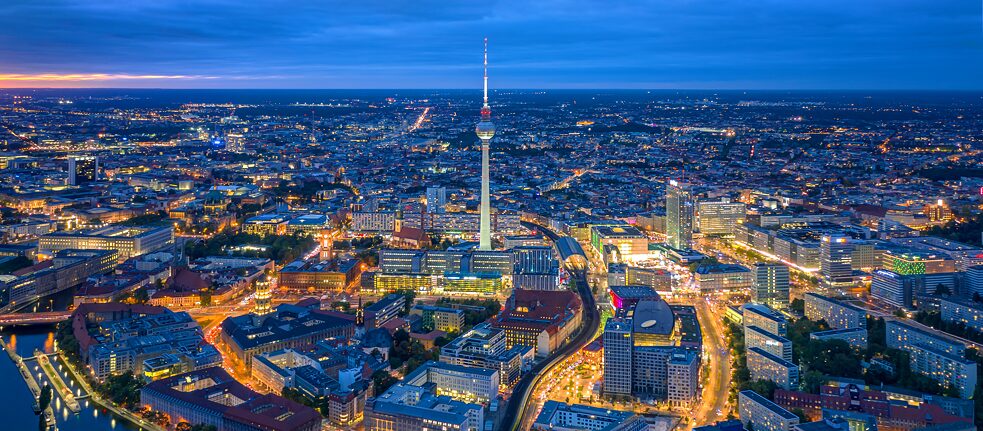 Paris seems to come across as much more impressive than Berlin by its very mention. But did you know that Berlin is nine times larger than the French capital in terms of area?
| Photo (detail): © Adobe
European countries have metropoles such as London or Paris as their capitals, worldwide there are megacities like São Paulo, Tokyo and Delhi. Germany has: Berlin. Berlin gets ridiculed somewhat for its population of around 3.5 million – although the metropolitan area does have 4.6 million inhabitants. The reason is that federal Germany is organised far less centrally than some of its neighbours, and boasts a few more cities with populations over a million – in the shape of Munich, Hamburg and Cologne.
Paris seems to come across as much more impressive than Berlin by its very mention. But did you know that Berlin is nine times larger than the French capital in terms of area?
| Photo (detail): © Adobe
European countries have metropoles such as London or Paris as their capitals, worldwide there are megacities like São Paulo, Tokyo and Delhi. Germany has: Berlin. Berlin gets ridiculed somewhat for its population of around 3.5 million – although the metropolitan area does have 4.6 million inhabitants. The reason is that federal Germany is organised far less centrally than some of its neighbours, and boasts a few more cities with populations over a million – in the shape of Munich, Hamburg and Cologne.
But wait until you hear this: Berlin is in fact nine times bigger than Paris! You don’t believe it? In terms of area, of course. And we’re only talking about the city centre. The metropolitan district of Ile de France, which includes all the suburbs as well, is significantly bigger. Incidentally, Berlin also has more bridges than Venice: around 900 in number, while there are only just over 400 in Venice (even that doesn’t make it the German champion – the port city of Hamburg has a huge total of around 2,500).
Mallorca, the 17th Bundesland
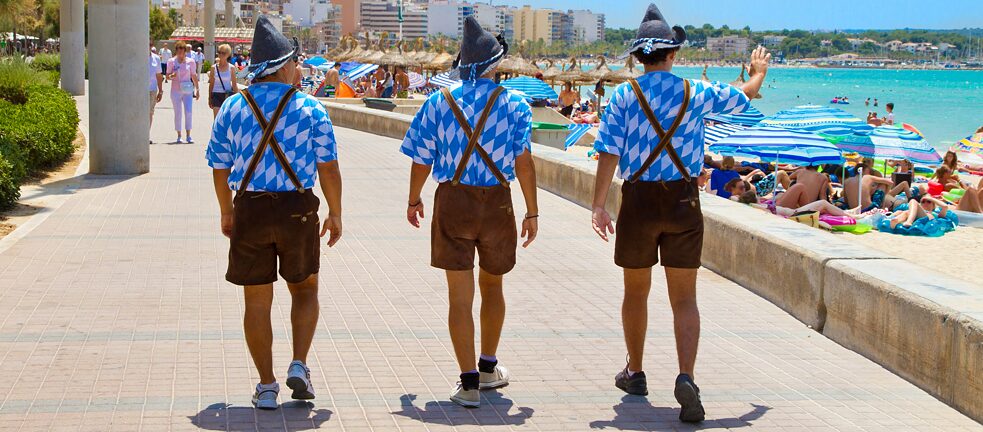 At least they aren’t wearing socks and sandals: instantly recognisable as German tourists on holiday. Presumably they don’t wear the ‘lederhosen’ at home.
| Photo (detail): © Adobe
Mallorca, “the 17th Bundesland” – this epithet is said to have been coined in July 1993, when the Bild newspaper ran the headline: “The craziest proposal from Bonn – Mallorca’s set to become German. MPs in Bonn are considering whether to lease the paradise isle for 99 years or buy it outright from Spain.” It wasn’t meant to be serious, but it shows how popular Mallorca is with Germans as a holiday destination. At first mainly well-to-do Germans were coming, later on those persecuted by the Nazi regime sought refuge here, and then it was German tourists enjoying a break.
At least they aren’t wearing socks and sandals: instantly recognisable as German tourists on holiday. Presumably they don’t wear the ‘lederhosen’ at home.
| Photo (detail): © Adobe
Mallorca, “the 17th Bundesland” – this epithet is said to have been coined in July 1993, when the Bild newspaper ran the headline: “The craziest proposal from Bonn – Mallorca’s set to become German. MPs in Bonn are considering whether to lease the paradise isle for 99 years or buy it outright from Spain.” It wasn’t meant to be serious, but it shows how popular Mallorca is with Germans as a holiday destination. At first mainly well-to-do Germans were coming, later on those persecuted by the Nazi regime sought refuge here, and then it was German tourists enjoying a break.
Generally speaking, Germans enjoy holidays and travel a lot. In 2019, the last pre-covid year, the country’s 80 million people went on around 70 million holidays. France, Italy, Greece and Portugal – to name but a few – are familiar with the deluges of German tourists too. One thing that seems quite incredible is that the Germans prefer to holiday in their own country, with the North Sea and Baltic coast being particularly popular. However their favourite travel destinations abroad are in fact on the Mediterranean – including in Mallorca.
Well-Organised And Humourless – Even on Holiday
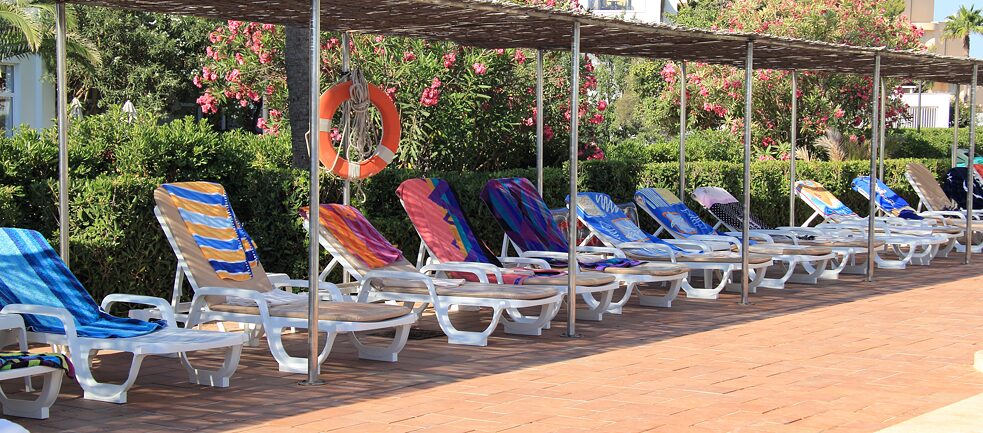 3,2,1 and it’s mine! Not quite – when it comes to towel-draping at the hotel pool, the Germans are in fact resoundingly beaten by the Brits.
| Photo (detail): © Adobe
Germans are organised and leave nothing to chance, according to the stereotype. To put it less positively: Germans are inflexible, stubborn and have no sense of humour. A classic example of this personality type is the notorious towel drop at the hotel pool. According to the stereotype, German holidaymakers are the first to swarm out in the morning to reserve a lounger by the pool or on the beach. Towel down – and it’s mine! Once that’s done it’s time for breakfast. However a British holiday website has revealed that this is not an inherently German characteristic: in fact it’s more likely that Brits on holiday will reserve a poolside lounger with their towel! At least that’s what can be inferred from the results of a survey involving several thousand holidaymakers from Germany and the UK, which was published by the Daily Telegraph in 2016.
3,2,1 and it’s mine! Not quite – when it comes to towel-draping at the hotel pool, the Germans are in fact resoundingly beaten by the Brits.
| Photo (detail): © Adobe
Germans are organised and leave nothing to chance, according to the stereotype. To put it less positively: Germans are inflexible, stubborn and have no sense of humour. A classic example of this personality type is the notorious towel drop at the hotel pool. According to the stereotype, German holidaymakers are the first to swarm out in the morning to reserve a lounger by the pool or on the beach. Towel down – and it’s mine! Once that’s done it’s time for breakfast. However a British holiday website has revealed that this is not an inherently German characteristic: in fact it’s more likely that Brits on holiday will reserve a poolside lounger with their towel! At least that’s what can be inferred from the results of a survey involving several thousand holidaymakers from Germany and the UK, which was published by the Daily Telegraph in 2016.
Like Clockwork
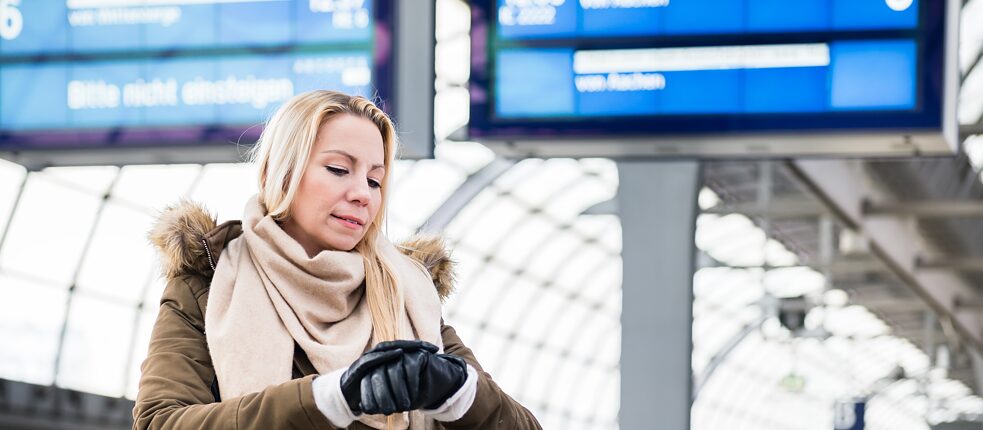 If you want to arrive at your destination on time, you’re better off not taking a Deutsche Bahn train. Because one thing’s for certain – the unpunctuality of German intercity trains.
| Photo (detail): © Adobe
With similes involving “die Maurer” (bricklayers), “die Feuerwehr” (the fire brigade), as well as “die Uhr” (like clockwork), Germany has no shortage of idioms for punctuality. Germans are well-known for being precise down to the last minute where the clock is concerned – better five minutes early for an appointment than two minutes late. Bus and rail timetables are expressed in precise terms too: a departure scheduled for 14:37 is not uncommon.
If you want to arrive at your destination on time, you’re better off not taking a Deutsche Bahn train. Because one thing’s for certain – the unpunctuality of German intercity trains.
| Photo (detail): © Adobe
With similes involving “die Maurer” (bricklayers), “die Feuerwehr” (the fire brigade), as well as “die Uhr” (like clockwork), Germany has no shortage of idioms for punctuality. Germans are well-known for being precise down to the last minute where the clock is concerned – better five minutes early for an appointment than two minutes late. Bus and rail timetables are expressed in precise terms too: a departure scheduled for 14:37 is not uncommon.
It’s another matter if you consider whether or not these times are observed. The German rail network, Deutsche Bahn, seems intent on single-handedly dismantling the German punctuality stereotype: the fact that travellers are already complaining about such a momentous delay by 14:38 does not deter the train company from continually triggering this sensitivity. According to the 2022 delay statistics, when it comes to punctuality Germany is actually far and away the worst performer in Europe: just 65.6 per cent of intercity trains were on time. Whilst that might depend on the varying definitions of delay, it’s more than just that. Incidentally Switzerland is the European frontrunner, while first place worldwide goes to Japan: the largest rail operator here claims that trains are on average 50 seconds late – which already includes delay caused by natural disasters.
Meat Is My Vegetable
 Pure carnal desire? Yum! However the majority of Germans state that their favourite food is pasta. Which doesn’t mean that meat consumption is low – schnitzel, sausage and doner kebab are in great demand too.
| Photo (detail): © Adobe
When hunger calls – whether you need a quick snack or a proper sit-down meal in a restaurant – Germany’s culinary repertoire relies on meat: Haxe (haunch), Leberkäs (meatloaf), Schnitzel (escalope), Kasseler (cured pork), and of course Currywurst (sausage with curry sauce) – the list of delicacies for carnivorous food lovers is long. In summer having a barbecue is the most popular hobby for Germans, and the barbecue itself works well as a masculine status symbol. Since 2009 there has even been a men’s magazine with a title completely targeted at the meat cult – “Beef”. So what might Germany’s favourite dish possibly be?
Pure carnal desire? Yum! However the majority of Germans state that their favourite food is pasta. Which doesn’t mean that meat consumption is low – schnitzel, sausage and doner kebab are in great demand too.
| Photo (detail): © Adobe
When hunger calls – whether you need a quick snack or a proper sit-down meal in a restaurant – Germany’s culinary repertoire relies on meat: Haxe (haunch), Leberkäs (meatloaf), Schnitzel (escalope), Kasseler (cured pork), and of course Currywurst (sausage with curry sauce) – the list of delicacies for carnivorous food lovers is long. In summer having a barbecue is the most popular hobby for Germans, and the barbecue itself works well as a masculine status symbol. Since 2009 there has even been a men’s magazine with a title completely targeted at the meat cult – “Beef”. So what might Germany’s favourite dish possibly be?
You might be surprised to learn that if you ask the citizens of the barbecue nation what they really like best, they’ll tell you: salad beats schnitzel. And potatoes beat salad. And in first place comes pasta! In fact according to the nutrition report published by the German government, pasta is the clear winner. Spaghetti, spätzle and other types of pasta are the favourite dishes of Germans, with potatoes and vegetable dishes trailing well behind. And Italian cuisine comes out tops for food delivery too: pizza accounts for around three-quarters of all online orders. Another thing confirmed by the report though is that meat-eating is a male thing. Meat is eaten daily by nearly half of all men in Germany – but only about one-quarter of women.
Related Links
May 2023
